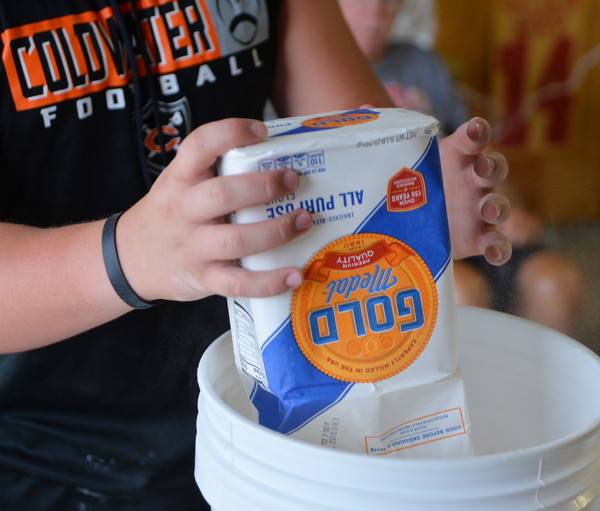Friday, August 5th, 2022
Burntwood-Langenkamp Wetland Conservation project
Latest wetland project has public unveiling
By Sandy Rose Schwieterman
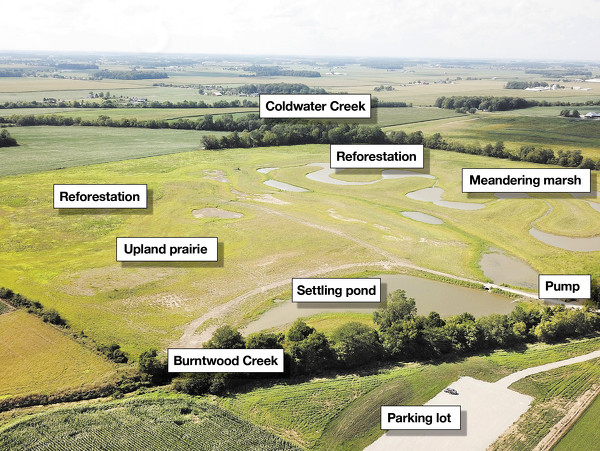
Photo by Ryan Snyder/The Daily Standard
The Burntwood-Langenkamp area, Grand Lake's first upstream treatment train, will consist of three wetlands, several acres of new trees and a large buffer area of planted grasses that will slow the flow of water, trap, filter and remove excess pollutants before they can run into the lake.
Roughly 25 people, including representatives of county environmental offices and members of the Langenkamp family, attended the public opening of the Burntwood-Langenkamp Wetland Conservation project on Thursday.
The 90-acre project is located on Coldwater Creek Road between Younger and Green roads.
The event was part of the Ag Education Series and sponsored by the Lake Improvement Association.
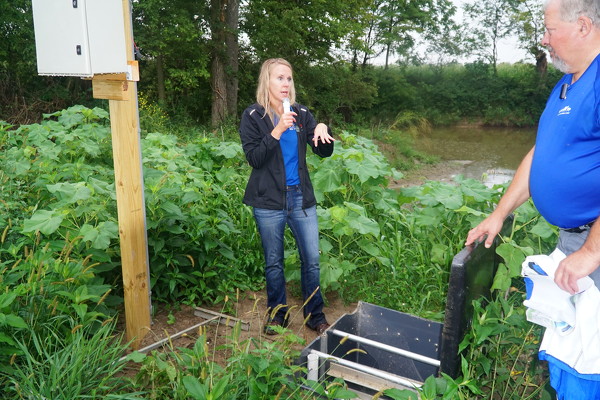
Photo by Sandy Rose Schwieterman/The Daily Standard
Theresa Dirksen, county agriculture and natural resources director, on Thursday morning explains how wetlands remove excess pollutants before they can run into the lake.
Theresa Dirksen, county agriculture and natural resources director, heralded the development as an exemplar in wetland design.
"In average rain circumstances, this treatment train will remove 90% of the nutrients and sediment in the water passing through," she said. "This new conservation area will be what other parts of the state will look to as a model (of an efficient wetland)."
The Burntwood-Langenkamp area is the newest of several wetlands and biofilters along the south side of Grand Lake.
The others include the Coldwater Creek wetlands, Mercer County Wildlife area, the Beavercreek vegetated biofilter, Windy Point wetlands and Gilliand Nature Preserve.
Plans for the Chickasaw Creek stream restoration and wetlands project are also in their final stages.
Wright State University-Lake Campus Professor Stephen Jaqcuemin, who oversees the monitoring of the site, said he and his students were measuring water for nutrients going in and out of the wetland area.
"We sample 24/7 at five locations and will have a very accurate estimate of how many gallons of water go through the site and the level of nutrient removal," he said.
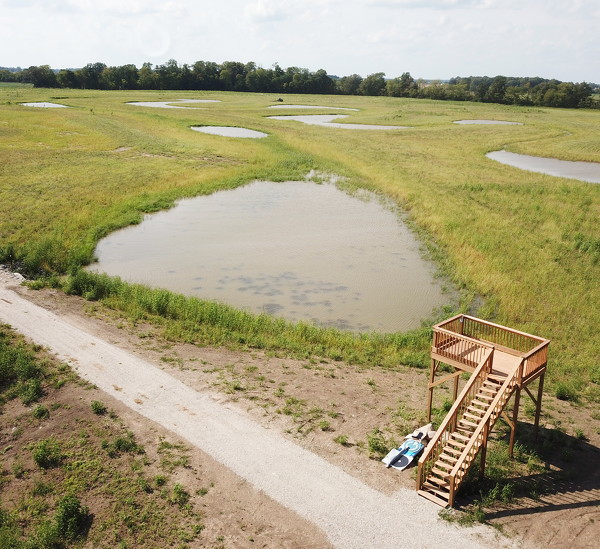
Photo by Ryan Snyder/The Daily Standard
Land for the Burntwood-Langenkamp Wetland Conservation Area, which was deputed to the public ion Thursday, was purchased early 2020 for about $1.1 million. The estimated cost to construct a wetland treatment train in the area is roughly $1.5 million.
Soon to be installed will be signage at the entrance of the preserve, as well as interpretive signs. A tower built by Maria Stein Eagle Scouts allows visitors a better view of the facility. Dirksen said there will also be a mile-long grass walkway around the property.
Connie Langenkamp-Simons, spokesperson for the Langenkamp family, expressed gratification about the new use of the family farm land. She added the property held many memories for her and her 15 siblings.
"We played here and worked here, so the place is part of our hearts," she said.
Langenkamp-Simons said the idea to have part of the family farm be used for this conservation project occurred to her while walking in a wetland conservation area close to her home near Napierville, Ill.
"It was so beautiful there, and when I found out how wetlands create cleaner water I started talking to the rest of the family about having the family land be used to create the same type system here," she said.
The children include Langenkamp-Simons, Beth Dammeyer, Patricia Wente, Margie Greishop, Roberta Chilimigras, Mary Wagor, Kathy Langenkamp, Jane Obringer, Bearnice Heim, Joe Langenkamp, David Langenkamp and Greg Langenkamp. Their parents were the late Norbert and Margaret Langenkamp.
Dirksen said treatment of the water begins when it enters the treatment train through a 5 horsepower pump moving 500,000 gallons per day from an inlet at Burntwood Creek.
The water flows into a settling pond, where particulates settle out of the water. The water then moves through a series of overland flow wetlands and through what Dirksen calls a meandering marsh, where plants absorb the organic nutrients. The cleaner water then exits into Coldwater Creek.
This project is the fourth treatment train associated with nutrient-reduction efforts at Grand Lake.
In June 2020, the Lake Facilities Authority used $1.1 million of Clean Ohio grant funding to purchase the 90-acre Langenkamp property at the junction of Burntwood and Coldwater creeks in Butler Township. Following acquisition, $1.5 million in H2Ohio program funding was used for the construction of the wetland treatment train featuring three created wetlands, several acres of planted trees and a large buffer area of planted grasses and native plants.
Additionally, the Langenkamp family donated 25% of the purchase price back to the project.
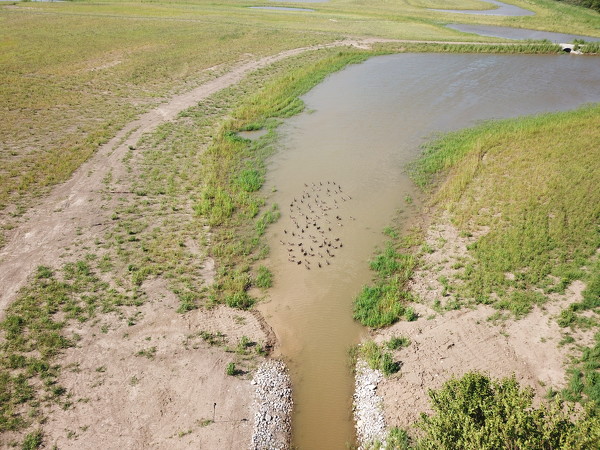
Photo by Ryan Snyder/The Daily Standard
Geese gather in a patch of water at the Burntwood-Langenkamp Wetland Conservation Area.




